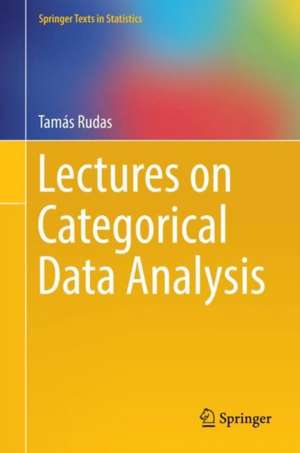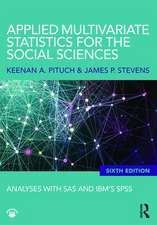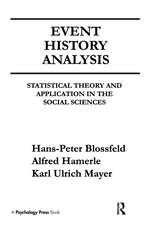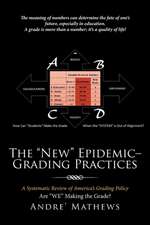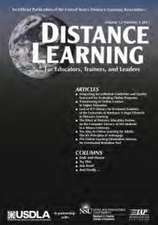Lectures on Categorical Data Analysis: Springer Texts in Statistics
Autor Tamás Rudasen Limba Engleză Hardback – 13 apr 2018
Assuming minimal background in calculus, linear algebra, probability theory and statistics, the book is designed to be used in upper-undergraduate and graduate-level courses in the field and in more general statistical methodology courses, as well as a self-study resource for researchers and professionals. The book covers such key issues as: higher order interactions among categorical variables; the use of the delta-method to correctly determine asymptotic standard errors for complex quantities reported in surveys; the fundamentals of the main theories of causal analysis based on observational data; the usefulness of the odds ratio as a measure of association; and a detailed discussion of log-linear models, including graphical models. The book contains over 200 problems, many of which may also be used as starting points for undergraduate research projects. The material can be used by students toward a variety of goals, depending on the degree of theory or application desired.
| Toate formatele și edițiile | Preț | Express |
|---|---|---|
| Paperback (1) | 456.71 lei 38-44 zile | |
| Springer Us – noi 2019 | 456.71 lei 38-44 zile | |
| Hardback (1) | 516.11 lei 38-44 zile | |
| Springer Us – 13 apr 2018 | 516.11 lei 38-44 zile |
Din seria Springer Texts in Statistics
-
 Preț: 400.60 lei
Preț: 400.60 lei - 15%
 Preț: 559.21 lei
Preț: 559.21 lei - 18%
 Preț: 903.62 lei
Preț: 903.62 lei - 20%
 Preț: 764.93 lei
Preț: 764.93 lei - 20%
 Preț: 643.55 lei
Preț: 643.55 lei - 20%
 Preț: 717.71 lei
Preț: 717.71 lei - 13%
 Preț: 486.97 lei
Preț: 486.97 lei - 20%
 Preț: 633.82 lei
Preț: 633.82 lei - 20%
 Preț: 697.48 lei
Preț: 697.48 lei - 15%
 Preț: 676.86 lei
Preț: 676.86 lei - 15%
 Preț: 621.10 lei
Preț: 621.10 lei - 20%
 Preț: 700.51 lei
Preț: 700.51 lei - 18%
 Preț: 743.11 lei
Preț: 743.11 lei - 18%
 Preț: 695.29 lei
Preț: 695.29 lei -
 Preț: 253.64 lei
Preț: 253.64 lei - 17%
 Preț: 525.27 lei
Preț: 525.27 lei - 17%
 Preț: 428.39 lei
Preț: 428.39 lei - 19%
 Preț: 571.81 lei
Preț: 571.81 lei - 20%
 Preț: 567.30 lei
Preț: 567.30 lei -
 Preț: 359.54 lei
Preț: 359.54 lei -
 Preț: 477.28 lei
Preț: 477.28 lei - 20%
 Preț: 570.35 lei
Preț: 570.35 lei - 15%
 Preț: 650.86 lei
Preț: 650.86 lei - 19%
 Preț: 626.93 lei
Preț: 626.93 lei - 18%
 Preț: 948.29 lei
Preț: 948.29 lei -
 Preț: 500.46 lei
Preț: 500.46 lei - 18%
 Preț: 746.59 lei
Preț: 746.59 lei -
 Preț: 403.75 lei
Preț: 403.75 lei -
 Preț: 403.37 lei
Preț: 403.37 lei -
 Preț: 394.71 lei
Preț: 394.71 lei - 18%
 Preț: 946.69 lei
Preț: 946.69 lei - 15%
 Preț: 578.67 lei
Preț: 578.67 lei - 15%
 Preț: 702.54 lei
Preț: 702.54 lei -
 Preț: 407.01 lei
Preț: 407.01 lei - 18%
 Preț: 895.89 lei
Preț: 895.89 lei - 15%
 Preț: 600.80 lei
Preț: 600.80 lei - 23%
 Preț: 684.78 lei
Preț: 684.78 lei - 19%
 Preț: 543.08 lei
Preț: 543.08 lei - 15%
 Preț: 595.86 lei
Preț: 595.86 lei -
 Preț: 423.18 lei
Preț: 423.18 lei - 15%
 Preț: 656.10 lei
Preț: 656.10 lei - 15%
 Preț: 682.90 lei
Preț: 682.90 lei - 18%
 Preț: 814.43 lei
Preț: 814.43 lei -
 Preț: 402.76 lei
Preț: 402.76 lei -
 Preț: 408.54 lei
Preț: 408.54 lei
Preț: 516.11 lei
Preț vechi: 637.17 lei
-19% Nou
Puncte Express: 774
Preț estimativ în valută:
98.75€ • 103.12$ • 81.55£
98.75€ • 103.12$ • 81.55£
Carte tipărită la comandă
Livrare economică 11-17 aprilie
Preluare comenzi: 021 569.72.76
Specificații
ISBN-13: 9781493976911
ISBN-10: 1493976915
Pagini: 282
Ilustrații: XI, 285 p. 1 illus.
Dimensiuni: 155 x 235 x 22 mm
Greutate: 0.65 kg
Ediția:1st ed. 2018
Editura: Springer Us
Colecția Springer
Seria Springer Texts in Statistics
Locul publicării:New York, NY, United States
ISBN-10: 1493976915
Pagini: 282
Ilustrații: XI, 285 p. 1 illus.
Dimensiuni: 155 x 235 x 22 mm
Greutate: 0.65 kg
Ediția:1st ed. 2018
Editura: Springer Us
Colecția Springer
Seria Springer Texts in Statistics
Locul publicării:New York, NY, United States
Cuprins
The Role of Categorical Data Analysis.- Sampling Distributions.- Normal Approximations.- Simple Estimation for Categorical Data.- Basic testing for categorical data.- Association.-Latent classes and exponential families.- Effects and associations.- Simpson's Paradox.- Log-Linear Models--Definition.- Log-Linear Models-- Interpretation.- Log-Linear Models--Estimation.- What's Next?.-References.
Notă biografică
Tamás Rudas is Director General of the Centre for Social Sciences of the Hungarian Academy of Sciences, and Professor in the Department of Statistics of the Faculty of Social Sciences, Eötvös Loránd University, Budapest. He is also an Affiliate Professor in the Department of Statistics, University of Washington, Seattle. He is a Fellow of the European Academy of Sociology and Past President of the European Association of Methodology. He was Founding Dean of the Faculty of Social Sciences of the Eötvös Loránd University and has held visiting positions in several statistics departments in the US and Europe. His research deals with methods for the analysis of categorical data, including marginal models and other generalizations of the log-linear model, and the assessment of model fit.
Textul de pe ultima copertă
This book offers a relatively self-contained presentation of the fundamental results in categorical data analysis, which plays a central role among the statistical techniques applied in the social, political and behavioral sciences, as well as in marketing and medical and biological research. The methods applied are mainly aimed at understanding the structure of associations among variables and the effects of other variables on these interactions. A great advantage of studying categorical data analysis is that many concepts in statistics become transparent when discussed in a categorical data context, and, in many places, the book takes this opportunity to comment on general principles and methods in statistics, addressing not only the “how” but also the “why.”
Assuming minimal background in calculus, linear algebra, probability theory and statistics, the book is designed to be used in upper-undergraduate and graduate-level courses in the field and in more general statistical methodology courses, as well as a self-study resource for researchers and professionals. The book covers such key issues as: higher order interactions among categorical variables; the use of the delta-method to correctly determine asymptotic standard errors for complex quantities reported in surveys; the fundamentals of the main theories of causal analysis based on observational data; the usefulness of the odds ratio as a measure of association; and a detailed discussion of log-linear models, including graphical models. The book contains over 200 problems, many of which may also be used as starting points for undergraduate research projects. The material can be used by students toward a variety of goals, depending on the degree of theory or application desired.
Assuming minimal background in calculus, linear algebra, probability theory and statistics, the book is designed to be used in upper-undergraduate and graduate-level courses in the field and in more general statistical methodology courses, as well as a self-study resource for researchers and professionals. The book covers such key issues as: higher order interactions among categorical variables; the use of the delta-method to correctly determine asymptotic standard errors for complex quantities reported in surveys; the fundamentals of the main theories of causal analysis based on observational data; the usefulness of the odds ratio as a measure of association; and a detailed discussion of log-linear models, including graphical models. The book contains over 200 problems, many of which may also be used as starting points for undergraduate research projects. The material can be used by students toward a variety of goals, depending on the degree of theory or application desired.
Caracteristici
Covers newest statistical and computational approaches to categorical data analysis Contains over 200 problems for the analysis of actual clinical trial content Designed for upper-undergraduate and graduate-level courses
